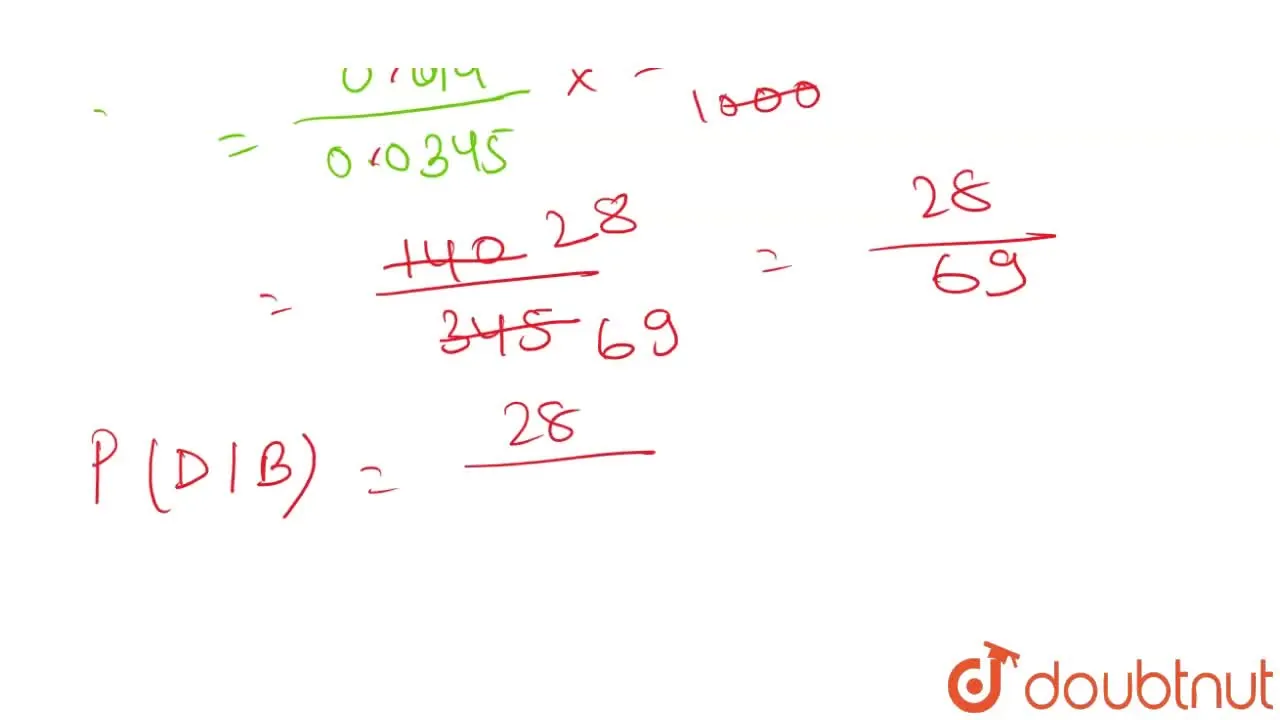Given two independent events A and B such thatP(A)=0.3,P(B)=0.6. Find(i) P(A and B) (ii) P(A and not B)(iii) P(A or B) (iv) P(neither A nor B)
According to the question,
P(A)=0.3
P(B)=0.6
Since, P(A')=1−P(A)
⇒P(A')=1−0.3
⇒P(A')=0.7
Similarly, P(B')=1−P(B)
⇒P(B')=1−0.6
⇒P(B')=0.4
(i) P(A and B) means P(A∩B).
Since A and B are independent events. Therefore,
P(A∩B)=P(A)×P(B)
⇒P(A∩B)=0.3×0.6
⇒P(A∩B)=0.18
Thus, P(A and B)=0.18
(ii) P(A and not B) means P(A∩B').
Since A and B are independent events. Therefore, A' and B' are also independent events. And hence, A,B,A' and B' all are independent events.
So, P(A∩B')=P(A)×P(B')
⇒P(A∩B')=0.3×0.4
⇒P(A∩B')=0.12
Thus, P(A and not B)=0.12
(iii) P(A or B) means P(A∪B).
As it is alredy known that,
P(A∪B)=P(A)+P(B)−P(A∩B)
⇒P(A∪B)=0.3+0.6−0.18
⇒P(A∪B)=0.9−0.18
⇒P(A∪B)=0.72
Hence, P(A or B)=0.72
(iv) P(neither A nor B) means P(A'∩B')
Since A' and B' are also independent events. Therefore,
P(A'∩B')=P(A')×P(B')
⇒P(A'∩B')=0.7×0.4
⇒P(A'∩B')=0.28
Hence, P(neither A nor B)=0.28
Related Playlists
Similar Questions
Given two independent events A and B such that P(A)=0.3 and P(B)=0.6 . Find: P(A∩B)
View SolutionGiven two independent events A and B such that P(A)=0.3 and P(B)=0.6 . Find: P(A∩B)
View SolutionGiven two independent events A and B such that P(A)=0.3 and P(B)=0.6 . Find: P(A∩B)
View SolutionGiven two independent events A and B such that P(A)=0.3 and P(B)=0.6 . Find: P(A∩B)
View SolutionGiven two independent events A and B such that P(A)=0.3 and P(B)=0.6 . Find: P(B/A)
View SolutionGiven two independent events A and B such that P(A)=0.3 and P(B)=0.6 . Find: P(A∪B)
View SolutionIf A and B are two independent events and P(A)=0.2,P(B)=0.3, then find the values of the following:
(i) P (A and B) (ii) P (A and not B)
(iii) P (A or B) (iv) P (none of A and B)View SolutionA and B are two independent events such that P(A) = 0.8 and P(A∩→B)=0.3 Find P(B)
View SolutionLet A and B be independent events with P(A)=0.3and P(B)=0.4Find(i) P(A∩B) (ii) P(A∪B)(iii) P(A∣B) (iv) P(B∣A)
View SolutionLet A and B be independent events with P(A)=0.3and P(B)=0.4Find(i) P(A∩B) (ii) P(A∪B)(iii) P(A∣B) (iv) P(B∣A)
View Solution


